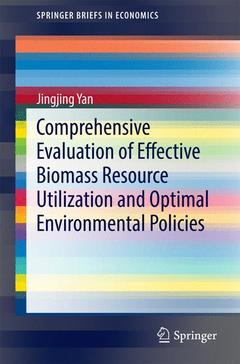Description
Comprehensive Evaluation of Effective Biomass Resource Utilization and Optimal Environmental Policies, 2015
SpringerBriefs in Economics Series
Language: English
Subjects for Comprehensive Evaluation of Effective Biomass Resource...:
Publication date: 09-2014
107 p. · 15.5x23.5 cm · Paperback
107 p. · 15.5x23.5 cm · Paperback
Description
/li>Contents
/li>Biography
/li>Comment
/li>
This book adopts a linear optimization method and introduces a dynamic optimization simulation model for analyzing synthetic environmental policies as endogenous variables in order to improve the environment and provide more biomass energy. The model considers both the total ecological system and the socio-economic situational changes. The purpose of the research is to establish effective utilization methods for biomass resources as well as to coordinate resource reutilization, environmental conservation and economic development, and ultimately to achieve sustainable development of society. By selecting for examination a typical suburb of a major city in China (Miyun County near Beijing), the book improves the simulation model and focuses on the evaluation of water pollutant minimization based on the ecological value of Miyun Reservoir. In the simulation, the author takes into account the specific and unique characteristics of China?s economy and social state in terms of sustained economic growth rate, financial subordination relations and regional environmental policies, all of which differ from the model for Japan. Beyond these innovations, the book introduces two advanced technologies from Japan and China to the study area through simulation with integrated policies, and presents a regional analysis and allocation strategy for these technologies, which have demonstrated impressive operability in practice, in light of the current conditions and limited funds in China.
Introduction.- Characteristics of the Study Area.- Evaluation of Water Pollutant-Minimization Policies with Adopting Present Technology.- Analysis is Optimal Environmental Policies with Advanced Technologies for Effective Treatment of Stockbreeding Wastes.- Comprehensive Evaluation of Environmental Policies with Advanced Technologies for Effective Utilization of Biomass Resource.- Cost Benefit Analysis and Regional Analysis.- Conclusions.
Jingjing YAN, female, associate professor of economics at China University of Geosciences in Beijing, P.R. China. Doctors in environment and resource industry economics, graduated from University of Tsukuba in Japan and China University of Geosciences Beijing in China. Main research fields include resource and environment economics, regional economics and industrial economics. As the head and coordinators of projects, she carried out a series of projects of Natural Science Foundation of China (NSFC) and provincial and ministerial level. She is the evaluation expert of Natural Science Foundation of China (NSFC).
Provides comprehensive evaluation of biomass resource utilization and environmental improvement Carries out improvement Analysis of a comprehensive simulation policy that is tailored to suit China's economy Shows simultaneous pursuit of environmental preservation and economic development Includes supplementary material: sn.pub/extras
© 2024 LAVOISIER S.A.S.




